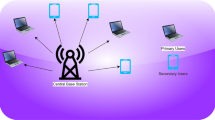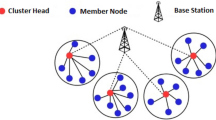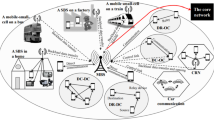Abstract
This article presents a distributed solution to autonomous quality of service provision. This method paves the way for decentralized and autonomous quality of service (QoS) provision in capillary networks that reach end nodes at Internet of Things, when, due to any reason, central management is either unavailable or not efficient. As case studies, cognitive spatial reuse time division access and code division multiple access communication networks are investigated. Based on asynchronous weak commitment search the task of QoS provision is distributed among different network nodes. This application of artificial intelligence in wireless and mobile communications can be used in home automation and networking, and vehicular technology. Extensions of this approach can be used in self organizing networks, specifically for machine to machine communications.











Similar content being viewed by others
References
M. Yokoo, E. H. Durfee, T. Ishida, and K. Kuwabara, “The distributed constraint satisfaction problem: formalization and algorithms,” IEEE Transactions on Knowledge and Data Engineering, vol. 10, pp. 673–685, September–October 1998.
M. Yokoo, Distributed constraint satisfaction: foundations of cooperation in multi-agent systems. Springer series on agent technology, Berlin, New York: Springer, 2000.
J. R. Marden and A. Wierman, “Overcoming limitations of game-theoretic distributed control,” IEEE transactions on automatic control, vol. 58, pp. 1402–1415, June 2013.
P. Phunchongharn and E. Hossain, “Distributed robust scheduling and power control for cognitive spatial-reuse TDMA networks,” IEEE Journal on Selected Areas in Communications, vol. 30, pp. 1934–1946, 2012.
A. Bayesteh, H. Nikopour, M. Taherzadeh, H. Baligh, and J. Ma, “Low complexity techniques for SCMA detection,” in 2015 GLOBECOM Workshops, pp. 1–6, 2015.
D. I. Kim, L. B. Le, and E. Hossain, “Joint rate and power allocation for cognitive radios in dynamic spectrum access environment,” IEEE Transactions on Wireless Communications, vol. 7, pp. 5517–5527, December 2008.
L.-C. Wang and A. Chen, “On the coexistence of infrastructure-based and ad hoc connections for a cognitive radio system,” in 1st International Conference on Cognitive Radio Oriented Wireless Networks and Communications (CrownCom), pp. 1–5, June 2006.
F. P. Kelly, A. Maulloo, and D. Tan, “Rate control for communication networks: shadowing prices, proportional fairness, and stability,” Journal of Operations Research, vol. 49, pp. 237–252, March 1998.
I. Muscalagiu, J. M. Vidal, V. Cretu, P. H. Emil, and M. Panoiu, “The effects of agent synchronization in asynchronous search algorithms,” in Proceedings of the 1st KES International Symposium on Agent and Multi-Agent Systems: Technologies and Applications, pp. 1–5, May–June 2007.
K. Hirayama and H. Yokoo, “The effect of nogood learning in distributed constraint satisfaction,” in Proceedings of the 20th IEEE International Conference on Distributed Computing Systems, pp. 169–177, 2000.
M. Yokoo, “Algorithms for distributed constraint satisfaction problems: A review,” Autonomous Agents and Multi-Agent Systems, no. 3, pp. 198–212, 2000.
A. Meisels, Distributed Search by Constrained Agents, Algorithms, Performance, Communication. London: Springer, 2008.
M. Silaghi and B. Faltings, “Asynchronous aggregation and consistency in distributed constraint satisfaction,” Artificial Intelligence, vol. 161, pp. 25–54, January 2005.
C. Fernandez, R. Bejar, B. Krishnamachari, and C. Gomes, “Communication and computation in discsp algorithms,” in International Conference on Principles and Practice of Constraint Programming, 2002.
Author information
Authors and Affiliations
Corresponding author
Rights and permissions
About this article
Cite this article
Sodagari, S. Application of Asynchronous Weak Commitment Search in Self Organized Cognitive Radio Networks. Int J Wireless Inf Networks 24, 404–412 (2017). https://doi.org/10.1007/s10776-017-0347-2
Received:
Accepted:
Published:
Issue Date:
DOI: https://doi.org/10.1007/s10776-017-0347-2




